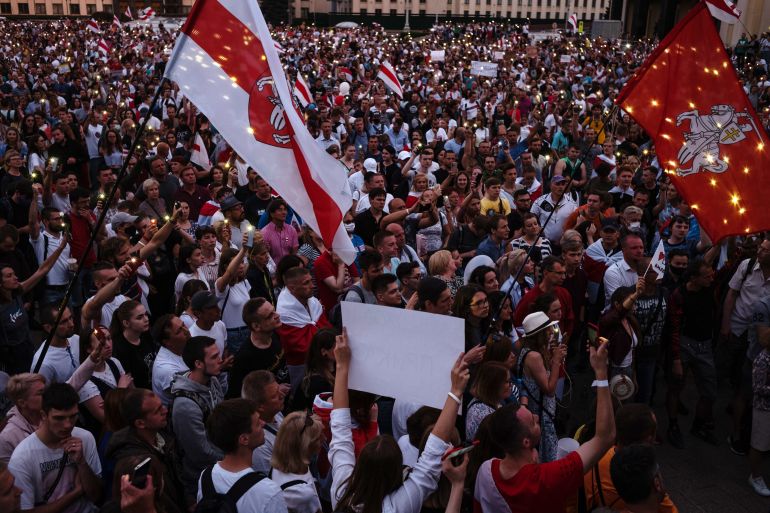Belarus blacklists 625 opposition figures as ‘extremists’
List banning people from holding public office and other activities includes opposition activists, journalists and protesters.

Belarussian authorities have added 625 people to a list prohibiting them from holding public office and other activities because of alleged ties to “extremists”.
The internal affairs ministry released an update of the blacklisted individuals, who now total 1,469. They include opposition activists, journalists, business leaders and others who took part in anti-government demonstrations in Belarus in 2020.
Keep reading
list of 4 itemsBelarus sentences journalist to eight years for ‘state treason’
Belarus charges dissident with organising ‘terrorist’ group
Belarus sentences dissident’s girlfriend to six years in prison
The Viasna Human Rights Center, whose founder Ales Bialiatski received the Nobel Peace Prize this month, said the expansion of the “extremism” watchlist is part of a broader climate of repression as President Alexander Lukashenko supports Russia’s war on Ukraine.
“Arrests, searches, torture in detention centres continue in Belarus,” Viasna said in a statement. “Pressure is put on political prisoners, and all those who disagree [with the government] are designated as extremists.
“Repressions are ongoing in respect to citizens who actively voice their civic position regarding the war in Ukraine, launched by Russia.”
Members of the Pahonia regiment, an all-Belarusian military unit that is helping the Ukrainian army in the war, were added to the list.
Individuals who are listed are not allowed to hold public office, teach, publish writing or participate in military service in Belarus. Anyone who is found disseminating “extremist” material faces a criminal charge punishable by a prison term of up to seven years.
Mass protests rocked the country for several months in 2020 after Lukashenko announced his victory in the presidential election. According to official results, he won more than 80 percent of the vote, but the opposition denounced the election as rigged.
Lukashenko’s challenger, Sviatlana Tsikhanouskaya, fled to neighbouring Lithuania as Lukashenko moved to stifle dissent, arresting more than 35,000 people.
Editor-in-chief Aksana Kolb of the independent weekly newspaper Novy Chas was also placed on the list. The newspaper has been blocked in Belarus.
Kolb was jailed for several months over the paper’s protest coverage and has since left the country. She said Minsk’s ongoing clampdown on opponents reflects its fear over “growing discontent in the country”.
“The authorities are trying to label anyone who expresses their position as an ‘extremist’ in order to shut their mouth and create a vacuum around that person,” Kolb said.
The government’s “extremist” register includes individuals and organisations as well as media outlets and websites.
Social media accounts linked to Valery Tsepkalo, an opposition politician and former presidential candidate who now lives abroad, were added on Friday.